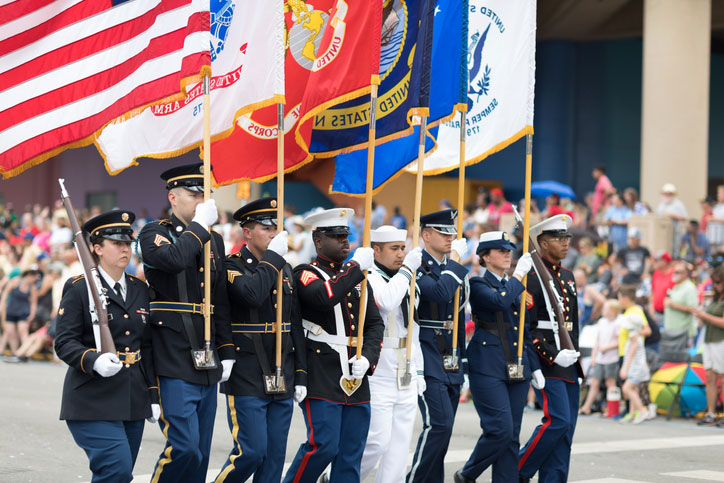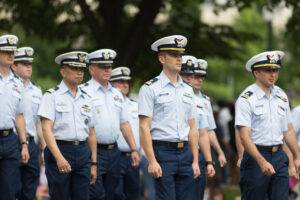
Every branch of the American military is utterly convinced it is the best. And every so often, this causes a little friction. Marines know not to walk into sailors’ bars unless they are looking for trouble (well, Marines are always looking for trouble). And let’s not even talk about the competition between the Air Force and Naval Aviation.
That kind of hardcore esprit de corps and a little friendly competition between branches is all part of the military experience. But so is training. With the most high-tech armed force on the globe, the United States can’t afford to skimp on putting well-educated service members in the field, no matter what uniform they wear.
The American military, every branch of it, has plenty of support and benefits to build that up. Backed up by the Department of Veterans Affairs, the Department of Defense has a generous set of common education benefits that members and veterans of every service can use. They include programs and opportunities like:
- Credentialing Opportunities On-line - COOL offers financial support for military members seeking civilian certifications or specialized training toward professional certification in their field.
- DANTES - The Defense Activity for Non-traditional Education acts like a big resource library for dozens of benefits ranging from career counseling to obtaining college credit for service training.
- Military Tuition Assistance - MTA, of course, is the most direct DoD support for military members attending college, offering tuition payments of up to $250 per credit hour regardless of branch or specialization.
- Student Loan Repayment Program - SLRP is also available at different levels as an enlistment incentive. The Army puts their own unique spin on this by offering complete student loan cancellations for troops deployed to combat zones, but the basic option is available in all branches.
You will find educational benefits starting before, continuing through, and even extending after your term of service.
But each branch is competitive, and that competitive spirit can be seen even among military recruiters from different branches. And that means that each of them has some extra benefits to offer to sweeten the pot.
We talk about the educational benefits available to every, or almost every, branch (even when they sometimes go by different names) in our Active Duty Military College Benefits Guide.
Here, though, we’ll go through the genuinely different educational benefit options that each service offers.
Explore Your Benefits Options
Army Education Benefit Programs
 The Army is by far the largest of the United States Armed Forces. It also gets the biggest chunk of the military budget each year, drawing over 30 percent of annual defense appropriations.
The Army is by far the largest of the United States Armed Forces. It also gets the biggest chunk of the military budget each year, drawing over 30 percent of annual defense appropriations.
Not all of that money goes to tanks and ammunition. There are several educational support programs unique to the Army to help train officers in advanced subjects needed to lead a modern military into the 21st century.
For Officers, Advanced Civil Schooling (ACS) Covers the Cost of a Graduate Degree
The Army might have the broadest range of different technologies and deployment responsibilities of any of the services. Army officers run everything from Patriot missile batteries to far-flung logistical networks to veterinary clinics. Many of the jobs required to keep those operations going take graduate-level education.
 Not all of those areas of expertise are things that service schools have the time or staffing to dive into. Master’s degrees from civilian universities are an expensive proposition for military officers, though, even with Military Tuition Assistance helping to foot the bill.
Not all of those areas of expertise are things that service schools have the time or staffing to dive into. Master’s degrees from civilian universities are an expensive proposition for military officers, though, even with Military Tuition Assistance helping to foot the bill.
The Army established the Advanced Civil School (ACS) program to help active duty and reserve officers get the education they need at civilian schools.
ACS fully covers tuition at approved schools and, just as important, assigns you the time you need to complete the program. You may even be allowed to pursue a doctoral program if the Army thinks that is required for your billet.
ACS Entry Requirements:
- Degree must be in line with your branch, functional area, or specialty
- Your undergraduate degree must be in an appropriate discipline and have a minimum GPA of 2.5
- Meet GRE or GMAT score minimums
- Be eligible for and agree to continue in a service obligation in the field of training consisting of three additional days of duty for every school day
ACS is primarily offered to eligible Army officers, both commissioned and warrant, but some non-commissioned officers in particularly complex specializations may also participate.
The value of this program is hard to quantify. Not all master’s programs have the same cost, but the Army pays full freight regardless. You also receive:
- Basic Allowance for Housing (BAH)
- Basic Allowance for Subsistence (BAS)
- Cost of Living Allowance (COLA)
- Regular pay and privileges according to your rank
Any program that lasts longer than 20 weeks is counted as a permanent change of station (PCS) and comes with the various allowances that go with that status.
The Funded Legal Education Program (FLEP) Will Put You Through Law School
FLEP is a very small Army-specific program with very generous benefits. Only 25 participants are selected each year. But you will be assigned to attend and graduate from law school and receive a guaranteed JAG Corps posting on graduation.
 Not every law school is eligible for FLEP money. Typically, you’ll have to find an in-state school or a school that offers military members in-state tuition rates regardless of residence. But all expenses are paid, including tuition and application costs. You also continue to receive your regular Army pay and receive a BAH, COLA, and BAS rates for the area your school is located.
Not every law school is eligible for FLEP money. Typically, you’ll have to find an in-state school or a school that offers military members in-state tuition rates regardless of residence. But all expenses are paid, including tuition and application costs. You also continue to receive your regular Army pay and receive a BAH, COLA, and BAS rates for the area your school is located.
FLEP is highly competitive, but it’s open to both active duty officers and non-commissioned officers. NCOs who qualify will also earn a direct commission in JAG once they satisfy the additional requirements for promotion.
FLEP Requirements:
- Hold a rank in grades from O-1 to O-3 or E-5 to E-7
- Serve in Operations, Operations Support, Force Sustainment, Health Services, Special Operations, or Cyber branch
- Hold bachelor’s degree
- Meet time in service requirements
If you take part in FLEP, you must agree to commit to an additional two years of service for each year of law school—that typically results in a six-year obligation on top of your existing commitment.
Air Force and Space Force Education Benefit Programs
 The Air Force operates some of the most complex, high-tech systems on the planet. Those birds don’t fly without advanced technical skills backed up by serious scientific knowledge. So you can bet that this branch backs up service members with generous college education benefits.
The Air Force operates some of the most complex, high-tech systems on the planet. Those birds don’t fly without advanced technical skills backed up by serious scientific knowledge. So you can bet that this branch backs up service members with generous college education benefits.
The Community College of the Air Force (CCAF)
It’s hard to top a branch of the service that actually opened its own college. But the Air Force did exactly that. Then they came back and topped themselves by automatically enrolling every enlisted airman on day one of basic.
CCAF is the world’s largest community college and is fully accredited by the Southern Association of Colleges and Schools, just like any civilian university.
You automatically earn credits through CCAF as you attend Air Force tech schools in your specialty. The focus of the college is to award you an associate degree in your specialty. But you can continue your training in the Associate to Baccalaureate Cooperative with a variety of online schools. More than 350 training paths are available.
CCAF isn’t free, other than credits you earn through assigned training. But it accepts MTA funding and is set up to make your studies smooth even through TDY and PCS moves.
The Air Force Technical Degree Sponsorship Program (TDSP) Offers High Tech Training
 TDSP is a concerted effort to increase the number of highly qualified officers in the Air Force who hold electrical and computer engineering degrees. It’s not a scholarship—your tuition and other educational costs aren’t covered (although you may be able to take advantage of SLRP or other official loan forgiveness programs once you are enlisted). But you do get paid while you study and have a guaranteed engineering officer position waiting for you after completion.
TDSP is a concerted effort to increase the number of highly qualified officers in the Air Force who hold electrical and computer engineering degrees. It’s not a scholarship—your tuition and other educational costs aren’t covered (although you may be able to take advantage of SLRP or other official loan forgiveness programs once you are enlisted). But you do get paid while you study and have a guaranteed engineering officer position waiting for you after completion.
To qualify, you need to be pursuing a technical degree and be within 24 months of graduation. Not just any engineering degree program will do, either; your program has to hold a specialty accreditation from ABET, the Accreditation Board of Engineering and Technology. And it’s not enough to just be slogging through; you need to be carrying a 3.0 GPA at a minimum.
Air Force TDSP Requirements:
- Take and pass the Air Force Officer Qualifying Test
- Compete at an Officer Training School board
- Agree to a four-year active duty commitment
Once accepted, you are immediately enlisted at an E-3 rating, which you’ll hold through the remainder of your schooling. That entitles you to all the pay and benefits of that rank while you are still studying, including healthcare.
After graduation, you’ll attend OTS, and become commissioned as an O-1 upon successful completion.
Navy Education Benefit Programs
 The Navy is a truly global force today, and that means dealing with the demands of training in a wide array of specialties and from a dizzying range of locations. Navy educational benefits are aimed at both officers and enlisted personnel to train up a force capable of both international relations on the high seas and operating increasingly high-tech vessels and aircraft.
The Navy is a truly global force today, and that means dealing with the demands of training in a wide array of specialties and from a dizzying range of locations. Navy educational benefits are aimed at both officers and enlisted personnel to train up a force capable of both international relations on the high seas and operating increasingly high-tech vessels and aircraft.
The Nurse Candidate Program (NCP) Pays You While You Earn a Nursing Degree
The Navy needs nurses, and the Nurse Candidate Program is a unique program that will help students through nursing school in return for an agreement to be commissioned as a nurse officer for between four and five years.
NCP doesn’t offer tuition coverage specifically, but it does dump a truckload of money on students who are accepted. You can use that cash any way you choose: make tuition payments, pay for food and housing during school, or buy a Tesla. Obviously, the tuition and housing things would be the most responsible way to go.
NCP Requirements:
- Meet Navy physical fitness standards
- Must not have reached your 42nd birthday prior to your date of commissioning
- Be enrolled in an accredited program leading to a BSN (Bachelor of Science in Nursing) within 24 months of entering the program
 If you are accepted, you are immediately entered into the Individual Ready Reserve as an officer candidate. In that status, you have access to military commissaries, exchanges, and base recreational facilities at any military base.
If you are accepted, you are immediately entered into the Individual Ready Reserve as an officer candidate. In that status, you have access to military commissaries, exchanges, and base recreational facilities at any military base.
But the real juice comes through a $10,000 signing bonus, paid in half within two weeks of your program start, and half after six months.
On top of that, you’ll receive a $1,000 per month stipend for each month you are in nursing school.
Once you graduate, on passing the NCLEX and becoming licensed, you’ll be sent to Officer Development School for commissioning as an ensign
Funded Legal Education Training (FLET) Offers Sailors a Path to JAG Corps Commissioning
 The Navy offers a program similar to the Army’s FLEP that will pay for law school as a part of their In-Service Procurement Program for the Judge Advocate General Corps. ISPP offers a pipeline to JAG commissions for active-duty sailors. Unlike the Army program, ISPP is only offered to enlisted sailors in pay grades E-5 through E-7.
The Navy offers a program similar to the Army’s FLEP that will pay for law school as a part of their In-Service Procurement Program for the Judge Advocate General Corps. ISPP offers a pipeline to JAG commissions for active-duty sailors. Unlike the Army program, ISPP is only offered to enlisted sailors in pay grades E-5 through E-7.
There are two paths through ISPP; you can earn you law degree on your own time and dime, or you can apply to FLET to have the Navy pick up the tab.
FLET Requirements:
- Hold a baccalaureate degree
- Have taken the LSAT
- Meet time in-service requirements
- Be of good moral character and have no disciplinary actions recorded against you
You also will have to apply to law school, and that’s where things get a little dicey. The Navy can require you to apply to up to three different law schools:
- One where you are eligible for in-state tuition
- One in a Fleet Concentration area
- One near your current duty station
It’s possible, of course, to find a single school that fits all three requirements.
If accepted to FLET, you will remain on active duty with full pay and benefits while you finish law school and take the bar exam. The program also covers:
- Full tuition and fee coverage for law school
- One bar exam review course
- All costs associated with bar examination
- Application costs to the court for admission to practice law
All graduates will attend Officer Development School and the JAG Basic Lawyer Course after bar admission. You’ll be required to extend your service for an additional two years for each year of law school attended.
The Navy College Program Lets You Earn Your Degree While At Sea
One educational benefit unique to the Navy (and its Marine Corps brethren) makes perfect sense if you think about it for a second. The challenges of offering a college education in a service that is basically designed to send people off around the world on ships and subs for months at a time require some adaptability to overcome. Where Army and Air Force, or even Coast Guard, billets often have the opportunity for service members to enroll at local colleges to expand their education, the Navy and Marines had no such option.
Enter NCPACE. A cooperative partnership with a variety of universities in CONUS, NCPACE offers off-line remote learning options for sailors and Marines at sea for extended periods.
Through NCPACE, you are actually earning a degree from a reputable, accredited civilian university—NCPACE just gives you the tools to do it while you are sitting on a cruiser somewhere in the South China Sea for months on end.
Even better, NCPACE will cover up to 100 percent of your tuition costs for those courses. The payment limits are the same as Tuition Assistance:
- $250 per hour,
- Up to a total of $4,500 per year
You also have a combined lifetime total cap of 120 semester hours per year split between TA and NCPACE, regardless of the actual per hour cost.
While any sailor can use Tuition Assistance, NCPACE is aimed straight at those who are unable to easily enroll in programs that make use of those funds. So to qualify, you must:
- Have been onboard for at least one year at your first permanent duty station
- Have served in the Navy for two years total
- Be assigned to a command with a unit type of Sea Duty or Overseas Sea Duty
You will be responsible for the costs of books and materials, and other school fees. You also may need to find a proctor on board, often an officer or senior enlisted rating you have no existing relationship with conflicts in your chain of command.
Marine Corps Education Benefit Programs
 The Marines have a pretty good deal when it comes to unique educational options: they can rely on many Navy programs as well as their own educational initiatives. For example, any Marine can take advantage of the Navy College Program. And while the Corps doesn’t have its own medical units, anyone interested in serving with the marines in a medical capacity can pursue the Navy Nurse Candidate Program and have the opportunity to work with Marines.
The Marines have a pretty good deal when it comes to unique educational options: they can rely on many Navy programs as well as their own educational initiatives. For example, any Marine can take advantage of the Navy College Program. And while the Corps doesn’t have its own medical units, anyone interested in serving with the marines in a medical capacity can pursue the Navy Nurse Candidate Program and have the opportunity to work with Marines.
On top of all that, the Corps does have a few of their own unique educational benefit programs up their sleeve for both officers and enlisted Marines.
The Special Education Program (SEP) / Advanced Degree Program Helps Officers Earn a Graduate Degree
Just like other branches, the Marines often find themselves a little short of certain military occupational specialties.
To do something about it, each year the Corps funds SEP, a program designed to encourage officers to pursue an advanced degree in one of those needed fields on the Corps’ dime. ADP is a companion program with fewer benefits but similar goals.
Through these programs, you can get graduate-level training in hot areas such as:
- Environmental management
- Electronics engineering
- Law
- Data systems
- Leadership development
These in-demand billets can vary depending on the current roster of expertise, so check with your command for eligibility.
Active duty officers are eligible in grades ranging from O-2 to O-4, and currently holding a baccalaureate degree.
SEP funds the entire cost of tuition and fees, as well as offering a stipend to cover the cost of books and supplies. ADP requires officers to pay their own way, although you can use GI Bill® benefits if you are eligible for those. Military Tuition Assistance isn’t available, however.
 SEP also offers a $200 thesis typing fee.
SEP also offers a $200 thesis typing fee.
SEP primarily sends students to the Naval Postgraduate Institute or the Air Force Institute of Technology, both military-run postgraduate degree granting institutions. Some degrees may be authorized to be earned at accredited civilian schools. ADP is only offered for civilian schools.
Just as important as any financial incentives, you will get the time you need to pursue those degrees. In effect, your school becomes your duty station for the length of the authorized pursuit of your degree.
It’s not required that you earn a degree as an outcome of the program, however. The Corps cares more about the knowledge you absorb than the piece of paper you might get at the end. This means you can use SEP or ADP to brush up on skills without the pressure of checking boxes that might not be immediately relevant to your career path.
You also have to pick just one or the other. Once you’ve used SEP benefits, for example, you can’t go on to use ADP to pursue a second graduate degree. As if a Marine is going to get two graduate degrees in the first place.
You will also have to extend your service commitment by three or four years, depending on the length of your graduate program.
The biggest catch is that you must be pursuing training dedicated to meeting the skills required in one of those in-demand specialty areas. Of course, there is a great deal of overlap between the important skills required in the active military and many high-paying civilian jobs. The Corps is happy to train you up as a lawyer free of charge, provided legal expertise is in need.
The Staff Noncommissioned Officer Degree Completion Program Helps NCOs Finish Degrees in Certain Fields
 Staff Noncommissioned Officer Degree Completion Program (SNCODCP) is a mouthful, but it’s the enlisted equivalent to SEP/ADP. The other major difference is that SNCDOCP covers baccalaureate, not graduate, degrees.
Staff Noncommissioned Officer Degree Completion Program (SNCODCP) is a mouthful, but it’s the enlisted equivalent to SEP/ADP. The other major difference is that SNCDOCP covers baccalaureate, not graduate, degrees.
Of course, the Corps isn’t going to cough up the kind of money for enlisted ranks that they do for officers. That means no additional tuition coverage (although you can use your Military Tuition Assistance benefits, if you otherwise are eligible for them) or stipends for books or supplies. And it’s a degree COMPLETION program—you need to be part way there before you apply.
What you do get is time to complete the program, and a guaranteed assignment in your MOS after completion.
You do have to commit to at least four years of service after graduation, too.
Only NCOs are eligible, in grades E-6 through E-8. You’ll also need at least an associate degree or otherwise have acquired two years worth of college credits toward the degree in question. The college you choose to attend must be approved for NROTC, although you will not necessarily be taking any ROTC coursework.
In some cases, you may need to hold a specific MOS to be eligible under certain specialty categories.
Enlisted marines who are accepted into the program have the opportunity to complete their bachelor’s degree in the required area and then get a guaranteed 36-month tour in the needed MOS. As of 2022, some of the needed areas of expertise included:
- Paralegal
- Psychology
- Accounting
- Education
Once you are accepted into the program, you’re on the clock—you’ll have to complete your degree within 18 months.
Coast Guard Education Benefit Programs
 There is much that is unique about the Coast Guard. Straddling the line between civilian and military roles, the Coasties often have a different way of doing things. That’s as true in their educational benefits as in operations.
There is much that is unique about the Coast Guard. Straddling the line between civilian and military roles, the Coasties often have a different way of doing things. That’s as true in their educational benefits as in operations.
Coast Guard Mutual Assistance Helps Anyone in the Coast Guard Family
CGMA is an independent non-profit that supports both active duty Coast Guard members, their families, civilian personnel, auxiliarists, and retired members. The organization offers a variety of different assistance programs, including several that offer educational benefits:
- Supplemental Education Grant - Offers up to $500 per year toward schooling costs
- Stafford/PLUS Loan Fee Reimbursement - Applying for these standard federal student loans through CGMA can get you a refund of associated loan fees
- Education Loan Program - CGMA itself offers loans of up to $3,000 to boost other military education benefits
- Tutoring - Eligible members can take advantage of online tutoring services at no cost during their studies
Although the amounts are modest, CGMA can make a big difference in a lot of lives by offering assistance exactly when and where needed. Since it’s not a part of the Coast Guard, or the government, the organization has more flexibility and less red tape to deal with when it comes to getting you the educational assistance you need.
College Student Pre-commissioning Initiative Is a Unique Officer Training Program
 CSPI is a Coast Guard scholarship program that is the closest thing you’ll find to a Coast Guard version of ROTC. If you are enrolled in or are accepted for enrollment in a bachelor’s degree program at an accepted school, you may qualify for full tuition assistance leading to commissioning as a Coast Guard officer.
CSPI is a Coast Guard scholarship program that is the closest thing you’ll find to a Coast Guard version of ROTC. If you are enrolled in or are accepted for enrollment in a bachelor’s degree program at an accepted school, you may qualify for full tuition assistance leading to commissioning as a Coast Guard officer.
To be eligible, you must be:
- At least 19 but less than 27 years of age as of the year you apply
- Meet high character standards and be a U.S. citizen capable of gaining security clearance
- May not have more than two dependents
- Have at least 30 credits accrued toward you degree
- Be holding at least a 2.5 GPA
- Meet certain financial qualifications
- Meet other established Coast Guard physical and educational standards
Once you are accepted into CSPI, you will be enlisted in the Coast Guard at an E-3 rating for the final two years of your degree. During one of the summers, you will attend and complete Basic Training. While completing the degree program, you’ll also participate in 16 hours per month of additional Coast Guard activities like training or assistance in recruiting offices.
During this period, you receive full pay for your rank. Tuition is covered at 100 percent, together with all fees, books, and supplies. Additionally, you’ll receive standard USCG housing allowance and medical benefits.
You’re on the hook for four years of active duty service and an additional four years of reserve duty. But as soon as you graduate college, you will be sent to Officer Candidate School in New Haven for 17 weeks. Upon successful completion, you’ll be commissioned as an O-1 and your active duty obligation will become three years.
These programs may not be the biggest factor in what service you choose to join. In fact, most of them are extremely competitive in their own right—there is no guarantee you’ll be admitted even if you do pick the branch that offers what you want.
But it’s valuable to know what opportunities may open up through the course of your career. And understanding the benefits that are specific to your branch will help you make the most of your military service.





